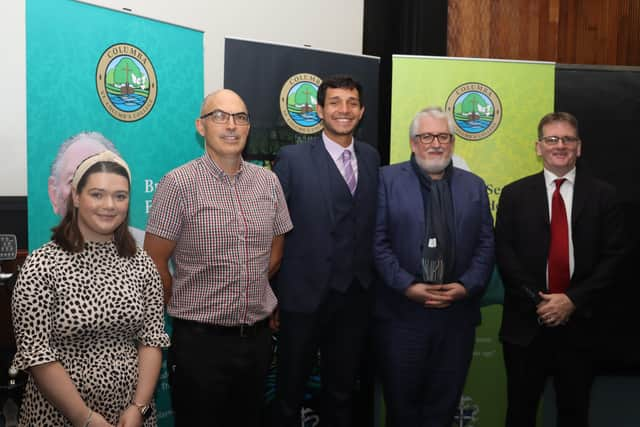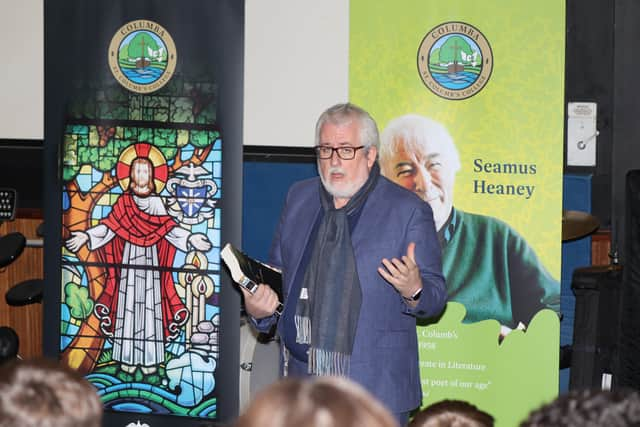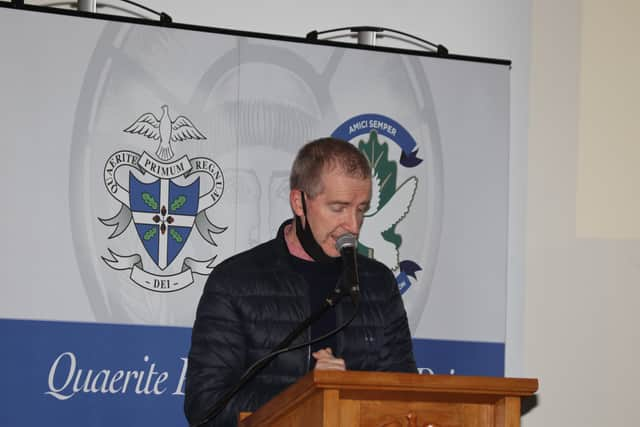OPINION: St. Columba and the Book by Ken McCormack
and live on Freeview channel 276
Did St. Columba’s copying of St. Finnian’s psalter lead to the first ruling on copyright viz: To every cow belongs its calf; to every book its copy? A psalter is a book of psalms and the incident, which is said to have occurred around 560AD, led to the battle of Cúl Dreimhne near Ben Bulben Co. Sligo and Columba’s eventual exile to Iona.
The famous tale was referred to by Dr. Stephen Kelly in his talk “Calves and Kindles”: St Columba and the History of the Book, on Friday evening October 22, in St Eugene’s Cathedral Hall. This was the inaugural event in a year of Columban celebrations organised by St. Columb’s College to commemorate the 1500th anniversary of St. Columba’s birth.
Advertisement
Hide AdAdvertisement
Hide AdThe talk was introduced by Mr. Finbar Madden, Principal, St. Columb’s College, who commented on the superb setting of St. Eugene’s Hall and warmly welcomed Dr. Kelly, himself a former pupil of St. Columb’s College and an expert on medieval texts alongside other research briefs.


On the subject of St. Columba and the copied psalter Dr. Kelly was quick to say that the tale found its origins in the early 1500s long after the Derry saint’s death (A.D. 597) - there being no mention of it in Adomnan’s Life of St. Columba written about a hundred later. Nonetheless, one school of thinking links the saint’s copied text to that contained in the Cathach (or Battler), a reliquary used by the Clan Ó Domhnaill as a rallying cry and protector in battle. Certainly this manuscript is one of the oldest surviving in Ireland, and the second oldest Latin psalter in the world.
Discussion on the Cathach brought Dr. Kelly on to the wider world of early medieval texts such as the Book of Kells and the Book of Durrow and the evolution from scroll to the eventual layout in columns and paragraphs that made the book much more practical to read. We were treated to a succession of magnificent pictures of early texts, many of them sublime in their interweave design and colour and all extraordinary examples of literary, artistic and religious innovation. Here Stephen Kelly made the very significant point that some texts appeared to have had a mystical, awe inspiring effect, on both scribe and viewer while others served a more devotional or prayerful role. This despite the occasional irreverent doodles (Woe is me…etc.) written on margins by exhausted young scribes.
Whatever the nature of these early texts they were confined to monasteries or the very privileged and this more or less persisted until the quantum leap of the Gutenberg Printing Press in 1450. Thereafter, with books more accessible, eventually the thrust of knowledge spread throughout the globe helping to bring about the dawn of modern civilization as we know it.
Advertisement
Hide AdAdvertisement
Hide AdDr. Kelly demonstrated that the medieval period is pivotal in the development of the book as we have come to know it in today’s world. That, of course includes the modern Kindles so cleverly mentioned in the talk’s title, the Calves furnishing the vellum that originally made the texts possible.


The abiding question is what made such progression come about? Experts tell us that it is down to technological innovation - the next phase driven by the last. Yet underpinning this is ‘why?’ What urges man to take the next step? We see it with the book so ably explained by Stephen Kelly, and we see it in art from Giotto to Leonardo da Vinci and the high Renaissance. Also, similarly in music, medicine and science. Historian Jacob Bronowski called it the Ascent of Man sadly omitting the God factor, to which believers thoroughly adhere and the breath-taking ancient Irish texts surely give voice to.
But is the book a thing of the past? Stephen Kelly believes not, feeling that despite the internet the book is alive and well in its many modern forms - ‘Even in a digital age it shapes profoundly our understanding of memory, history – and ourselves,’ he says.
Thus long live the book in its pop-up forms, its talking and kindle forms, its new and innovative jackets and layouts, and much more - and isn’t it the case that a beautifully bound text is truly delightful to hold and possess. We must not forget that even the look of a library of books can be awe-inspiring. This, so well evident in the ancient Melk Library near Vienna where the gold binding on the books is said to cast a mystical glowing light over the setting lifting minds and hearts to contemplation. Books here seem not destined for reading but rather for inspiration, for though full of knowledge the removal of one destroys the balance of the whole magical aura.
Advertisement
Hide AdAdvertisement
Hide AdThus on it goes with the book in its many guises as popular as ever it was.


Dr. Kelly’s talk was most eloquent, skilful and absorbing. Expert in his discipline he delivered a challenging topic in an easy, relaxed and comfortable style before a highly appreciative audience. Full marks to the St. Columb’s organising committee for such an enjoyable evening One looks forward to forthcoming events and perhaps another time when Dr. Kelly can take us into the world of the monastery scriptorium to witness how such beautiful texts came about.
Covid restrictions were in place for the talk but it would be remiss not to mention the delightful refreshments at the end so well managed by the eager young students of St. Columb’s.
*Note: The Book of Durrow and the Book of Kells - ancient Irish masterpieces, may be viewed in the old library of Trinity College, Dublin (booking necessary).
An excellent recent copy of the Book of Kells on velum by the late Cyril Morrison may be viewed in the Chapter House of St. Columb’s Cathedral, Derry. (Closed presently due to Covid).
Ken McCormack